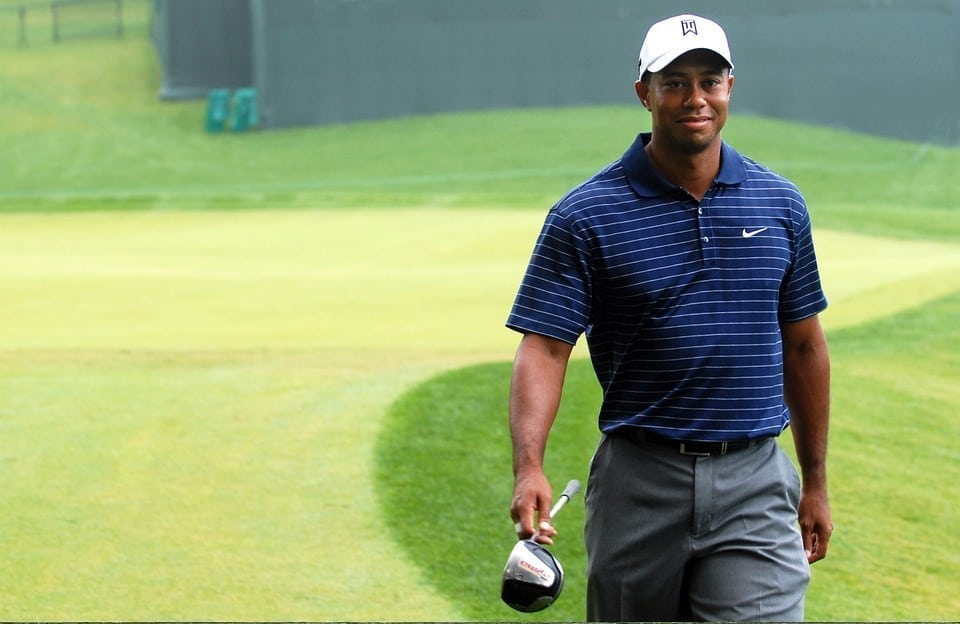It was the only time I saw him try too hard,” said Tiger’s caddie, Steve Williams.
Seldom could it be said in the prime of his career that Tiger lost a major because of pressing or trying too hard, but this time it cost him a very personal victory.
It might not have happened at the 2006 Masters had it not been for the intense emotion he had been enduring the several months prior.
Players of all levels lose strokes to pressing or trying to hard, for a wide variety of reasons that can cover the spectrum of human emotions.
For Tiger it was an unusual case of “outcome” and “mechanical thinking” that was rooted in his deep concern for…the thoughts, wishes and feelings for his Dad. And who wouldn’t in his situation? It was the very first time his father and mentor, Earl Woods, would not make the trip with him to Augusta. And perhaps it might even be the last time his father would watch him play in a major on television.
Tiger is human. And on this rare occasion, under extreme emotional duress, circumstances weakened Tiger’s normally intense focus on the process of simply creating shots, and let it be skewed by the importance of his play that day.
Players with untrained mental skills frequently lose strokes to trying too hard, most often without even knowing it! They mistakenly blame their equipment, swing flaws, poor conditions, the weather, or at times even another person for the adversity.
When the player with one of the best mental games ever falls prey to some faulty thinking, it is not hard to imagine how easy it is for the rest of us to do the same. But he, like many other great players, has invested time and energy into getting to truly know himself and his tendencies in competition. He has made mental coaching an important part of the development of his game, and places value in learning from adversity.
These players set themselves apart by being more aware of the real reasons they are losing strokes or struggling with some adversity. This allows them to correct the real problem instead of going off in a time consuming and false direction, like changing teachers or making a swing change.
For Tiger this led to three-putting the 11th at Augusta to fall five shots behind the leader. On 13 he had a 6-foot eagle putt, which he missed; then on the 15th, a 12-foot eagle putt which he also missed. His 3 putt on 17 was one of six for the week and it left him three shots behind Phil Mickelson–all very unlike Tiger when in contention at a major.
Earl Woods sadly lost his fight with cancer the following month. Tiger wisely took the next nine weeks off to grieve. When he came back for the U.S. Open he understandably missed the cut for the first time ever in a major.
What does a Champion Tour Pro do after a heart breaking experience takes a toll on his play?
Learning from adversity is an important skill to have, because adversity faces every athlete at some point. Tour pros certainly aren’t exempt from that.
First he works through some of the intense emotion. Then, and this is the important part, he determines to learn from the adversity and use what he learns to not only turn his game around but to make it better.
Tiger resolved to commit himself to learning from the difficulties he was having playing to his potential; he was on a mission to get organized, to get back to basics and make them even better, back to creating shots.
He describes it coming together in one hour of a three hour practice session after a tough start in Chicago. In that hour he regained the creativity, sharpened his focus on the process of hitting shots, later saying “I had every shape, shot, height, spin, whatever you wanted”. Tiger then went on to finish his 2006 PGA Tour season with six consecutive victories!
But Tiger doesn’t measure himself by trophies or awards, rather by something much more personal to him, his own assessment of his play and how much he learns. “Am I a better golfer right now than I was at the beginning of the year? If the answer is yes, then it’s a successful year,” he said. “Because if I did that for the rest of my career it’s a great career.”
Like every true champion, Tiger aspires to, and does get better through adversity.
In your own game, be sure to spot what exactly is causing your adversity. Regardless of whether or not you can resolve the situation, figure out how it’s affecting your game. Once the issue is identified, learning from adversity becomes possible. Remember that pressure tends to be cumulative. Just because you struggle initially after an adverse situation doesn’t mean you will continue to struggle.
Once you learn how to recover from the situation, you will have a better idea of how to handle it better the next time around. If you take note of how you improved your game, you should also be able to generalize the change to fit other distractions.
Contact us for a free consultation. We can help you handle adversity better.


